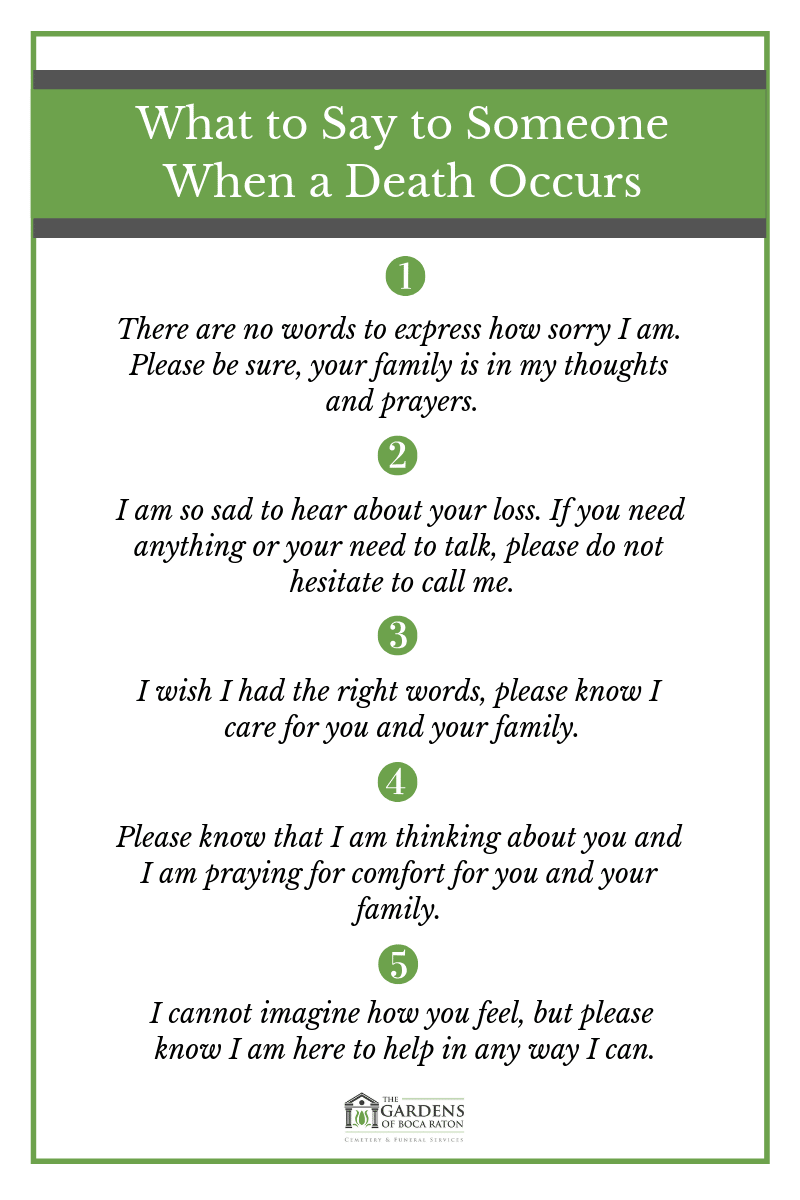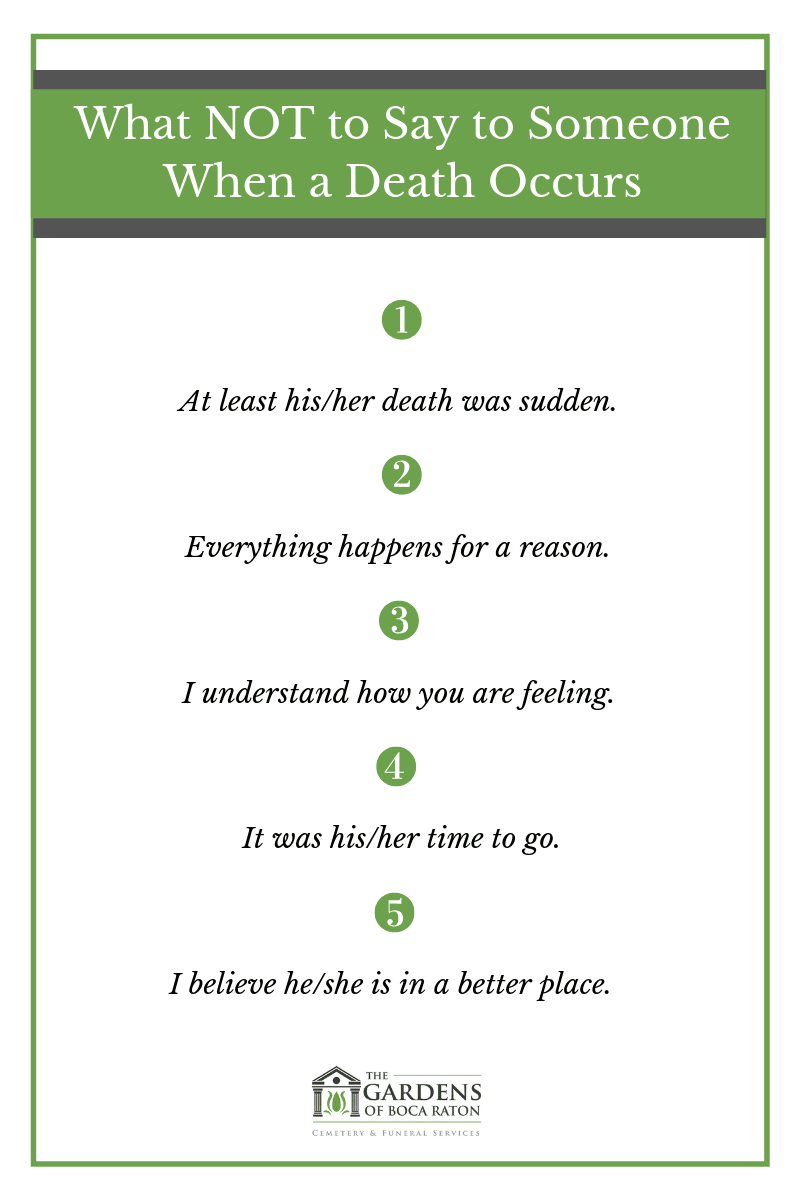What to Say to Someone When a Death Occurs
At The Gardens of Boca Raton, comforting grieving families is our highest priority. We recognize that for most people, choosing what to say to someone when a death occurs can be uncomfortable and challenging. While we want to express our condolences, we are also anxious about saying the wrong things, and it can be challenging to find the right balance when considering what to say when someone dies. After all, when someone experiences the death of a loved one, they might be overwhelmed with emotions and grief, which can result in different reactions to our words. Often, the most comforting things are not in the forms of words but in the generosity of our presence.
Other things like attending the funeral or memorial service, visiting the family, and calling, are all supporting ways to show someone they are not alone in their sorrow. However, knowing what to say when someone dies can also help us avoid uncomfortable moments at funerals and burials.
Finding the Right Words
Some people ramble when they are nervous, so try your best to concentrate on keeping the conversation brief and meaningful. Finding the right words means being genuinely honest, comforting, and able to show sympathy for their loss in as few words as possible.
As you think about what you are going to say, remember:
- Be specific
- Be empathetic
- Express your sadness
- Speak from your heart
- Allow yourself to be upset
Comforting Things You Can Say
If you ever find yourself at a loss for words for the bereaved, be assured you are not alone. Most people find this to be an uncomfortable situation. Think before you speak to make sure you do not say something you will regret later. Regardless of what you choose to say, you want to make sure to:
- Offer your genuine support and companionship
- Share memories and mention the name of the person who passed away
Also, you also want to remember that your support matters. If you do not get the chance to speak to any of the grieving family members during the funeral, take some time to leave a sympathy message on the funeral guestbook, or send a sympathy card after the funeral. Both ways, your condolences will get across to the family, and they will sincerely appreciate your support.
Other comforting things you can say:
- “There are no words to express how sorry I am. Your family is in my thoughts and prayers.”
- “My favorite memory of [name] is…”
- “I am so sad to hear about your loss. If you need anything or you need to talk, please don’t hesitate to call me.”
- “[Name] brought so much joy to everyone around him/her. He/she will be missed by so many.”
- “Please know that I am thinking about you and I am praying for your comfort.”
- “I cannot express how my heart aches for you. You will be in my thoughts and prayers.”
- “I am truly sorry for your loss.”
- “I cannot imagine how you feel, but please know I am here to help in any way I can.”
- “I wish I had the right words. Please know I care for you and your family.”
- “[Name] was such a generous person. We will all miss him/her. However, his/her legacy will live on through all the great work he/she did.”
These are things you can say to someone during or after the funeral. You can also use them in sympathy cards. For more things to say to express your condolences or to write in sympathy cards, visit: 15 Best Sympathy Quotes for Passings.

What Not to Say to the Grieving
While finding what to say when someone dies is challenging, knowing what not to say to the grieving family is even more challenging. Of course, when you are offering your condolences and support the last thing you would want to do is offend someone; or even worse, offend the legacy of their loved one. When you are expressing your condolences, make sure to:
- Do not say “I understand” or compare their loss to yours
- Do not begin any sentence with “well, at least…”
- Avoid offering certain religious condolences
Some words are better left unsaid. Although it is easy to say inappropriate things when you are stressed or nervous, what you say can upset those grieving. Remember that any loss is painful, regardless of the circumstances. The last thing you want to do is diminish someone’s pain or loss.
Some things to avoid saying:
- “At least his/her death was not sudden.”
- “Everything happens for a reason.”
- “I believe she/he is in a better place.”
- “Hang in there. Everything will be okay.”
- “It was God’s will.”
- “I understand what you are feeling.”
- “You will feel better when you…”
- “You have to stay strong for…”
- “It was his/her time to go.”
- “We all saw this coming.”
APPROPRIATE TRAITS WHEN DEALING WITH GRIEF
When finding things to say when someone dies, it is essential to examine not just what you say but also how you say it and how your loved one perceives it. There are certain traits that you should try your best to display, and some that you should always attempt to steer clear of.
Traits to display when dealing with the grief and loss of a loved one:
- Kindness
- Compassion
- Understanding
- Patience
- Generosity
- Helpfulness
- Supportive
- Present
- Sympathetic
- Available
Traits not to display when dealing with the grief and loss of a loved one:
- Impatience or hurriedness
- Selfishness or self-centeredness
- Disagreeable or cold
- Short-temperedness
- Minimizing or downplaying the situation
- Comparing their grief and loss to others

What Else Can You Do?
When someone dies, your words will mean the world to those grieving. So will your actions, however. Ultimately, offering your sincere sympathy and support during such a difficult time is what matters most. Let them know that you have not forgotten them. Let them know they can count on your support as they move through the various stages of grief at their own pace. Consider reaching out to them after the funeral or burial, visit them, keep in touch, help them in the house, and be there for them so they can lean on you in times of struggle. They will much appreciate your support.
Writing Sympathy Letters
When someone experiences a death in the family or the loss of a loved one, writing a sympathy letter or sharing your thoughts on a sympathy card can be greatly appreciated by those grieving. But finding the right words to help comfort someone after they’ve lost a love one is always a difficult endeavor. You have to balance the line between showing heartfelt condolences and trying not to upset them further.
We’re going to share several tips on what you should write in a sympathy letter or card, and we’ll explain why they’re important and sometimes necessary.
6 Tips to Writing a Sympathy Letter or Card
By just taking some time to write a sympathy letter or shopping for a good sympathy card goes a long way in helping someone understand how much you care for them in their time of need. Here are a few tips for writing a sympathy letter that will help you get across what you want tactfully.
Short Letters Do the Job
Don’t be concerned about sharing every memory or listing out all the ways someone touched your life. Remember that it’s more important to be heartfelt and genuine than it is all-encompassing.
This is All About Them, Not You
You don’t want them to feel like they have to console you for your loss – so make sure you let them understand how much they are in your thoughts. “You must be going through so much right now,” is a good way to say you’re thinking about them and their current situation.
Don’t Make Comparisons to Your Life
One of the worst things you can do is to compare their loss to a loss you’ve experienced. Eventually, they might ask for your advice, but saying things like, “I know what it’s like,” and “I know how it feels to lose someone,” is just not helpful at this time. Knowing that every person and every relationship is different, try to say something like, “I can’t imagine what they’re going through right now.” You can, however, say something like, “You were there for me when I went through my loss, and I want to be there for you.”
Share a Single Fond Memory
Rather than listing off all the ways your life changed because of this one person, try to just pick out one specific memory that encompasses their love and spirit. Maybe it was something poignant they said to you when you were down. Maybe it was something they praised you for when you were up.
Leave the Drama Behind
If you had some bad experiences with the person that died, now is not the time to acknowledge that. Concentrate your letter on the grieving person and that you are sympathetic with their loss of a loved one.
Offer Specific Help
Don’t just ask them to let you know how you can help – offer specific ways you can help them during their difficult time. Tell them you can pick up their kids from school or let them know you will do some shopping or cooking for them. Think of what they’ll need – and how you can help them.
ACTS OF KINDNESS TO SHOW SUPPORT
While knowing precisely what to say when someone dies is important, perhaps the most critical thing during this challenging time is that you show your loved ones you are there for them no matter what. Everyone handles coping with grief and loss differently, and some people have a more difficult time than others.
One thing, however, is certain–it can be very hard to do even the most mundane and everyday activities when you’re struggling with the loss of a loved one. Things like cooking, cleaning, and taking out the dogs can seem like monumental tasks. For some people, these feelings last only a few days, while for others, they can last for extended periods. It is now more than ever that acts of kindness will make the most difference in helping your loved one through this time.
What you can do to show your support:
- Call, video chat, or text message your loved one daily to let them know you are thinking of them. They may not answer you immediately, and that’s okay as long as you let them know you’re there should they need you.
- The immediate days following an individual’s passing are often filled with visitors and food deliveries, yet these favors slowly dwindle off. Remember that your loved one is likely still struggling after the dust settles, and continue to send them meals in the weeks following their loss. You may want to ask if you can order groceries for delivery, if they need help with meal prepping for the week, and more.
- Offer to complete yard work, such as mowing the lawn, for the family.
- Offer to complete small tasks around the house, like taking the garbage out on garbage night, throwing in a load of laundry, putting away the dishes when you come over, and more. Or, you can hire a cleaning service or home care professional to assist as well.
- If they have pets offer to take the pets out for walks and make sure they’re adequately stocked up on pet supplies. If they’re running low on something, grab it for them. Offer to hire a dog walker or pet sitter if necessary.
- If your loved one has children ask if you can pitch in with childcare duties. School and activity drop-offs, homework help, and even taking the kids on an adventure for the day so mom and dad can have some quiet time are extremely helpful.
- If they are responsible for cleaning the home or sorting through the belongings of the deceased, offer to either help them yourself or hire a professional service to complete the job.
- Ask if they need help with any legal aspects of dealing with a death, such as an estate lawyer, talking to creditors and lenders, and more.
- Simply sit and be present with your loved one. Watch movies together, eat meals, or go for a walk. Even if you complete these activities in silence it often feels good just to know that there is another person by your side during challenging times.
GIFTS FOR A PERSON STRUGGLING WITH GRIEF AND LOSS
In addition to knowing what to say when someone dies and showing acts of kindness and support, you may wish to buy your loved one a gift. Gifts can be either useful items that will help them throughout the day, or they can be purely sentimental products of comfort. Both are appropriate when a person is struggling with grief and loss.
Gifts ideas for a loved one may include:
- Gift cards for local restaurants, meal delivery services, or home care services and entertainment.
- A stuffed animal with a kind note.
- Food baskets and platters.
- A personalized gift, such as an engraved piece of jewelry or journal where they can log their feelings.
- A framed photo of your loved one and the deceased from a fun time they spent together.
- Self-care items such as aromatherapy lotion, shower gel, face masks, and more.
- Comfort items, such as a scented candle, a cozy blanket, a soft pair of pajamas, and more.
- A beautiful card with a handwritten note.
ADDITIONAL RESOURCES TO HELP YOUR LOVED ONE DEAL WITH GRIEF AND LOSS
Once you decide what to say when someone passes, you may be left with more questions following your conversation. It may become apparent to you that your loved one is struggling, which can be difficult to watch and may leave you feeling helpless and unsure of the right next steps. It’s important to know that there are resources for grieving families, and it’s not uncommon for a person to experience depression following the death of someone close to them.
If you believe your loved one may need additional help, consider these resources:
- Find self-help books and podcasts that focus on the grieving and healing process.
- Find a grief counselor, either local or via Telehealth, through your loved one’s insurance plan.
- Have a discussion about depression and anxiety medication, connect your loved one with the appropriate doctor if necessary.
- Participate in therapeutic activities together, such as painting, drawing, journaling, and more.
The Gardens of Boca Raton is here for you and your family in their time of need. Call today.



